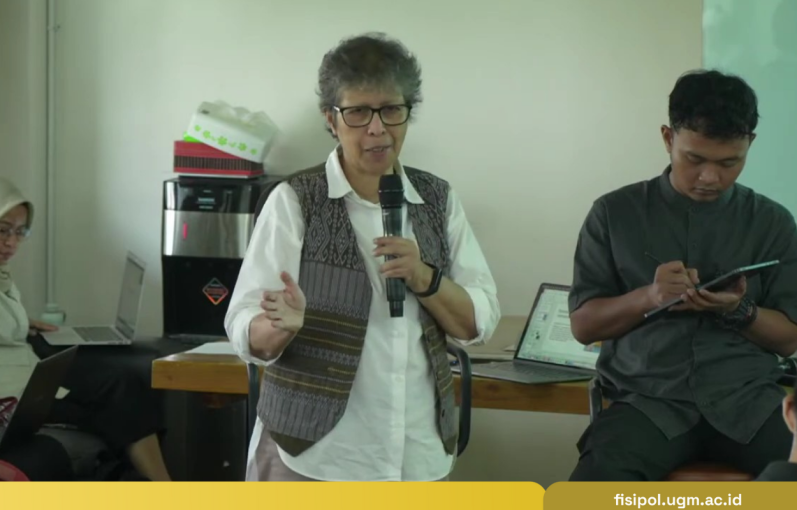
Yogyakarta, November 1st 2024─As a result of the long dry season, a number of regions have experienced severe drought, resulting in the Special Region of Yogyakarta being put on emergency alert. This issue was discussed in a book discussion entitled “Ngelep, Ngrumat, Niteni: Political Ecology of Caring for Water and Living Space in Central Java” with several political and environmental experts on Friday (1/11) at the Department of Politics and Government, Faculty of Social and Political Sciences UGM.
Jogja as a tourist city has many environmental problems, one of which is drought. Apart from being caused by the long dry season, this disaster also occurs structurally. According to Yesaya Sandang, a writer and researcher at Satya Wacana Christian University, Jogja faced the issue of water usage for tourism in 2014. “The tourism sector is ‘water-hungry’, we often see that hotels and tourism are fine. But in reality, in the tourism sector the water demand is quite high,” said Yesaya.
At that time, a massive public movement using the hashtags #JogjaAsad and #JogjaDidol caused an extraordinary explosion. People flocked to protest the water consumption of hotels and other tourism sectors. Yesaya revealed data that said the use of water by one tourist could reach from 84 to 2,000 liters per day. This amount has not been added to the use of water to manage accommodation in the hospitality business.
“Not to mention the indirect aspects, fuel, vegetable, it can range from 2,000-3000 liters. The use of water for recreation is not a human right,” explained Isaiah. A total of 725 hotels in Jogja can consume 6,000 liters per day, equivalent to the water consumption of 50,000 households. This fantastic amount is expected to continue to rise due to the big ambitions of tourism.
Unfortunately, neither the community nor the government has highlighted the threat of this water issue. Suraya Affif, Lecturer in Anthropology at the University of Indonesia, said that only a few people can respond to the water issue in Jogja. According to him, the community currently needs an alliance to be able to voice their concerns. Moreover, the issue of hospitality concerns the main sector in driving Jogja’s economy.
“This is a phenomenon, if it doesn’t go viral there is no justice. This then pressures the government. It is impossible for the government to act if there is no pressure,” Suraya explained. The government in power relations will judge an issue as important or not based on the majority. As long as the issue is not highlighted, there will be no action from the government.
Suraya continued, people are often overshadowed by narratives of progress and modernity. This also makes it difficult for people to respond and fight back. Infrastructure development to tourism ambitions are claimed as a form of the country’s progress, forgetting the environmental aspects that need to be observed.
In line with this, International Relations lecturer Marwah described how the concept of public water needs to be implemented. She mentioned the clean water crisis in Jakarta which also caused various public responses. When the issue has reached the realm of public discussion, there is no framework to create public water transparency. “This water issue is a shared issue, but its manifestation depends on each region. This infrastructure needs to be considered, for example by not relying solely on PDAM water,” said Marwah.
Water policy needs to be implemented to regulate water consumption in various sectors by prioritizing the needs of the community. Industrial and tourism sectors need to be wise in using water to manage business. Amalinda Savirani, Lecturer of DPP UGM hoped that the discussion and book launch “Ngelep, Ngrumat, Niteni: Political Ecology of Caring for Water and Living Space in Central Java” can bring the urgency of water issues to a wider stage. This event is also a form of the Faculty’s contribution to the implementation of the 6th Sustainable Development Goals, namely Clean Water and Sanitation.
